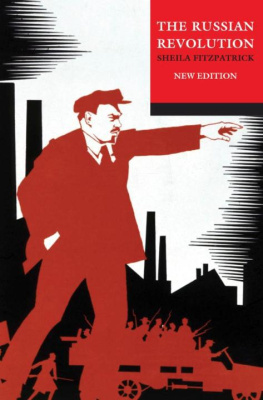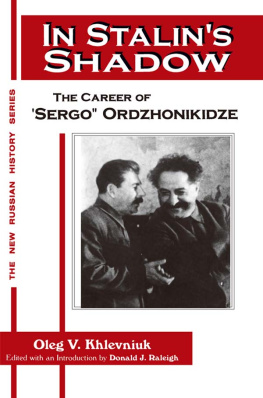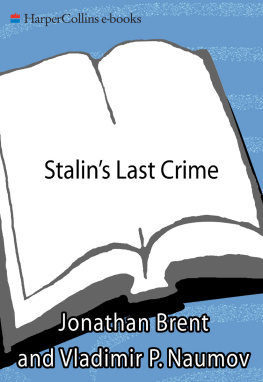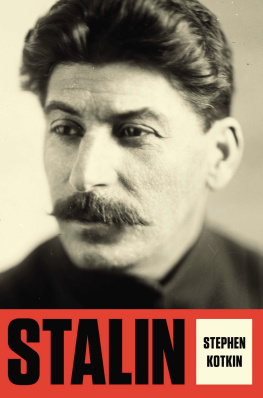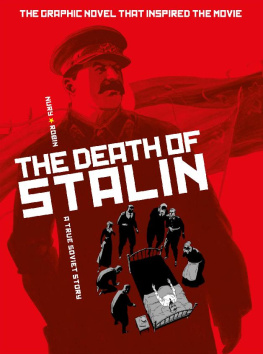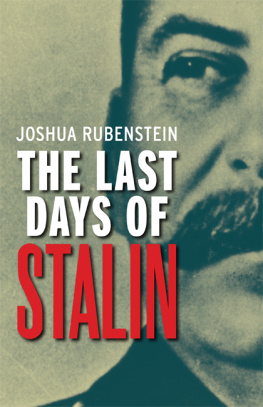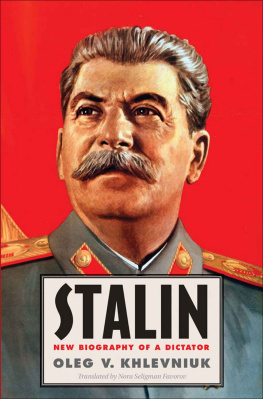ON STALINS TEAM
ON
STALINS
TEAM
THE YEARS OF LIVING
DANGEROUSLY IN
SOVIET POLITICS
SHEILA FITZPATRICK
PRINCETON UNIVERSITY PRESS
PRINCETON ANDOXFORD
MELBOURNE UNIVERSITY PRESS
An imprint of Melbourne University Publishing Limited
1115 Argyle Place South, Carlton, Victoria 3053, Australia
mup-info@unimelb.edu.au
www.mup.com.au
This edition published 2015
Published by arrangement with Princeton University Press, 41 Williams Street,
Princeton, New Jersey 08540
All rights reserved
First published in the United States
Text Sheila Fitzpatrick, 2015
This book is copyright. Apart from any use permitted under the Copyright Act 1968 and subsequent amendments, no part may be reproduced, stored in a retrieval system or transmitted by any means or process whatsoever without the prior written permission of the publishers.
Every attempt has been made to locate the copyright holders for material quoted in this book. Any person or organisation that may have been overlooked or misattributed may contact the publisher.
Typeset in Eurostile and Arnon Pro
Cover design by Mary Callahan
Printed in Australia by McPhersons Printing Group
National Library of Australia Cataloguing-in-Publication entry
Fitzpatrick, Sheila, author.
On Stalins team: the years of living dangerously in Soviet
politics/Sheila Fitzpatrick.
9780522868913 (hbk)
9780522868920 (ebk)
Includes bibliographical references and index.
Stalin, Joseph, 18791953.
Stalin, Joseph, 18791953Friends and associates.
PoliticiansSoviet Union.
Soviet UnionPolitics and government19171936.
Soviet UnionPolitics and government19361953.
947.0842
CONTENTS
EXPLANATORY NOTE
I HAVE FOLLOWED LIBRARY OF CONGRESS TRANSLITERATION RULES, except for substituting y for the final ii in male proper names, dropping the extra i that strict transliteration would require in names like Maria and Evgenia, and using y instead of i in front of vowels in names like Vyacheslav and Nadya to make pronunciation easier. Where there is a familiar Anglicization of a proper name, like Allilyueva or Alexander, I have used it, and I have rendered Iurii as Yury and Iosif as Joseph. For women, I have kept the feminine version of Russian last names: for example, Molotova (Molotov), Krupskaya (Krupsky).
Before the Second World War, ministries in the Soviet government were called Peoples Commissariats and the ministers were called Peoples Commissars. For clarity, I will use the term ministry and minister throughout. For convenience, I call the Council of Peoples Commissars (Sovnarkom) the government. I use the term Supreme Soviet for the body that until 1938 was called the Executive Committee of the All-Union Congress of Soviets. Its chairman was the title head of state, sometimes referred to as president, of the Soviet Union.
When I cite visits to Stalins Kremlin office, no reference is given in the endnotes because they always come from his office log, published as Na prieme u Stalina: Tetradi (zhurnaly) zapisei lits, priniatykh I. V.Stalinym (19241953 gg.), ed. A. A. Chernobaev (Moscow: Novyi Khronograf, 2008). (I used the earlier journal version, Posetiteli kremlevskogo kabiineta Stalina, ed. A. V. Korotkov, A. D. Chernev, and A. A. Chernobaev, published in Istoricheskii arkhiv, 1994, no. 61997 no. 1.)
A useful summary of this data for the 1930s (Politburo members and Central Committee secretaries only) may be found in Oleg V. Khlevniuk, Masterof the House: Stalin and His Inner Circle (New Haven: Yale University Press, 2009), appendix 2, 26671. Data on Politburo attendance in the 1930s are from the table in Stalinskoe Politbiuro v 30-e gody: Sbornik dokumentov, comp. O. V. Khlevniuk et al. (Moscow: AIRO-XX, 1995), 183255. My quick reference for the Secretariat of the Central Committee of the Soviet Union was http://en.wikipedia.org/wiki/Secretariat_of_the_Central_Committee _of_the_Soviet_Union, but I have tried to check this information against other sources.
Russian archival locations are identified by fond (collection), opis (inventory), delo (file), and list (folio), but I have rendered this in abbreviated form. Thus, RGASPI, f. 17, op. 1, d. 100,l.1 appears as RGASPI 17/1/100,l.1.
Regarding dates, in February 1918, Russia switched from the Julian calendar to the Gregorian, thirteen days ahead. I give dates in the Julian style before the switch and Gregorian after. This means that the Bolshevik Revolution occurred in October 1917, not early November (as in the Gregorian calendar).
GLOSSARY
BOLSHEVIK: Name of the group (later party) that split from the Russian Social-Democratic Labor Party in 1903; in the first decades after the October 1917 Revolution, it was used as the party name jointly with Communist, which ultimately replaced it.
CENTRAL COMMITTEE OF THE COMMUNIST PARTY: Elected by Communist Party congresses, it was nominally the partys leading organ, although in practice the Politburo became the decision-making body.
CHEKA: Security police in the Civil War period (later known as GPU, OGPU, NKVD, MVD/MGB, KGB).
CIVIL WAR: Fought in 191820 between the Reds (Bolsheviks) and the Whites, the latter with foreign support from Western interventionists.
COMINTERN: International organization of Communist Parties set up in 1919 and run from Moscow.
COMMUNIST: Name of the ruling party from October 1917; see Bolshevik.
COUNCIL OF PEOPLES COMMISSARS OF THE SOVIET UNION (Sovnarkom): Highest organ of the government before the war, renamed Council of Ministers after the war.
DACHA: Weekend place outside town.
FEBRUARY REVOLUTION: Event that resulted in the abdication of Tsar Nicholas II in 1917 and that established the Provisional Government, which was then overthrown by the Bolsheviks in October 1917.
GKO: State Defense Committee, key wartime body.
GPU: See Cheka.
GULAG : The chief administration of camps under the NKVD, which applied to the entire labor camp system.
JAC: Jewish Anti-Fascist Committee (194248), headed by Solomon Mikhoels, under the supervision of Solomon Lozovsky.
KOMSOMOL: Communist youth organization.
kULAK: Prosperous peasant, regarded by the Bolsheviks as an exploiter of the poor.
LEFT OPPOSITION: Groups headed by Trotsky (192324) and Zinoviev (192526) that were in political struggles with the Stalin team.
LENINGRAD: Capital of the Russian Empire (under the names of Saint Petersburg and Petrograd [191424]); renamed after Lenins death, now again Saint Petersburg.
MENSHEVIKS: The larger group (party) produced by the split in the Russian Social-Democratic Labor Party (RSDLP) in 1903.
MGB: Ministry of State Security in the 1940s (see also Cheka). NEP: New Economic Policy of the 1920s.
NKVD: The name of the security police from 1934 to the war; the initials stand for Narodnyy Komissariat Vnutrennikh Del (Peoples Commissariat of Internal Affairs) (see also Cheka).
OCTOBER REVOLUTION: Bolshevik seizure of power in 1917. OGPU: See Cheka.
OLD BOLSHEVIK: Term used informally for party members who had joined before the revolution.
ORGBURO: One of two bureaus of the partys Central Committee (the other being the Politburo) in charge of organizational functions.


